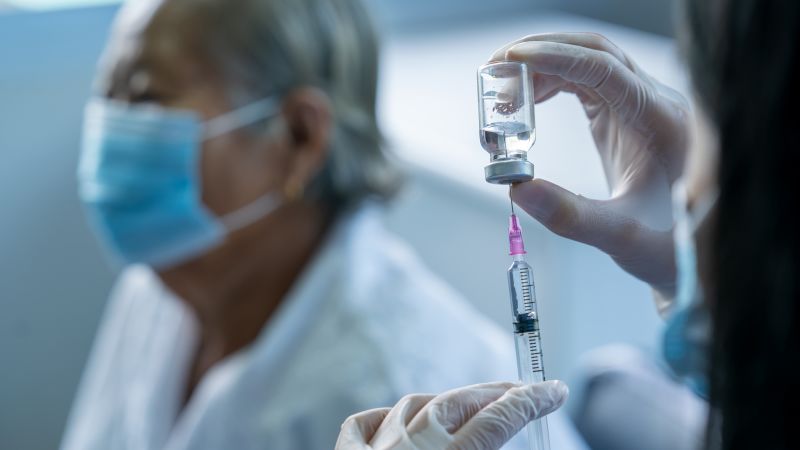Vaccine misinformation, which first began spiraling during the Covid-19 pandemic, has grown in the United States in the years since, according to a new survey from the Annenberg Public Policy Center of the University of Pennsylvania.
More than 1,500 adults responded to the survey between October 5 – 12 and according to the results, the share of people who viewed vaccines as less safe and effective has increased since April 2021, when the group was first included on a panel for the survey.
Americans are less likely to consider it safe to get the measles, mumps and rubella (MMR), pneumonia and Covid-19 vaccines than they were in April 2021.
While still a small group, people with views about the vaccines causing autism, cancer and illnesses such as the flu or Covid-19 also ticked up.
Reminds me of a recent study where dog owners are starting to question the rabies vaccine
We’re going to live through a time where this “skepticism” results in old diseases coming back.
Oh for Christ’s sake… do they not know what rabies is?
Getting or spreading rabies is not an option.
Unfortunately a very large group of people seem to be taking an approach of “it didn’t directly happen to me therefore [either it never will or it’s not really a big deal],” and even when it does there’s a natural reluctance to admit fault so they’ll find something else to blame rather than rethink how their previous opinion led to their current situation.
We’re going to live through a time where this “skepticism” results in old diseases coming back.
in recent years, anti-vaccination sentiment has allowed for the reemergence of measles outbreaks […] There is concern that the World Health Organization (WHO) may rescind the U.S.'s measles elimination status […] The director of the National Institutes of Health wrote in 2016 that parents refusing to vaccinate their children were leading to outbreaks of preventable diseases, including measles. The World Health Organization also reported that the rise in measles is a direct result of anti-vaccination movements.
Anti-vaxxers are a public health hazard.
Man, I work with one of these people.
He mocked me because I got a flu shot and a covid booster last month.
But in the past year, he got “a really bad flu” three times already and still refuses to get vaccinated.
He will probably die young from the extra wear and tear of repetitive sickness. His lungs will be all scarred over, calloused, and grey. Yours will be all soft and pink.
Why do I have to share the planet with these people? It’s inherently unjust.
There are ways…
how does vaccine misinformation lead to only 7% of adults taking the most recently available vaccination? there’s either some other reason (or a few other reasons) or 93% of people subconsciously desire a return of the pandemic. it cant be that, can it? maybe it’s partially availability or lack thereof, but it seems like that cant be the only reason.
vaccinations protect us when everyone we interact with gets vaccinated. that’s how it works… right?
As someone who got the latest booster, my take is that people believe that COVID has mutated to be less deadly. The fact boosters have been so long in coming and are still often hard to find (still haven’t been able to get our kids boosted, and we live in a major metro), combined with that perception of COVID has led to these low rates.
I am not sure if COVID has become les deadly, but I would believe it: I haven’t seen it affect anyone nearly as badly since the most recent strains became prevalent. That, and most of the people I know were vaccinated before, and though looking for boosters, aren’t as scared of COVID and will get them when they can.
Essentially: people view COVID like the the flu now, and as far as I know, that seems like it might be fine.
COVID isn’t a flu, and treating it like it isn’t fair when you can be completely asymptomatic and spread it to someone who may have a really bad reaction to it.
The thing about the flu is that it has very obvious symptoms. You’re not getting the seasonal flu without knowing it. Meanwhile you may never know you have COVID, spread it to an immunocompromised person, and they die.
That’s really surprising so me, everyone I know was waiting for the new booster like it was Taylor Swift tickets, avoiding events until two weeks after they got it, calling around to pharmacies 50 miles away to get it a few days early. It was required for my work.
I live in a very liberal, very affluent Bay Area county, I don’t know if that’s related.
I have an appointment to get it next week. That’s pretty much the earliest appointment I could get. I can’t really blame people for not getting vaccinated if it’s not available.
I think a huge part of this is because there has been no real follow up demonstrating the successes of vaccination, I’m sure plenty of studies have been done and everything but no one hears about them - meanwhile antivax are obsessively memeing every possible thing that could help their cause true or not.
That’s their right. I’m just glad we have access.
No.
Herd immunity is one of the important goals of a vaccination program. In particular it helps protect people who cannot receive vaccines due to other health issues (e.g. being immunocompromised, having a recent organ transplant, etc).
Groups of unvaccinated people create a population in which a virus can multiply and mutate, potentially becoming resistant to previously effective vaccines.
Selfish idiots who refuse vaccination create an entirely preventable health risk to everyone else, especially those who are vulnerable for other reasons. They literally threaten everyone else’s lives. They should be treated as such.
Dang. Good point







